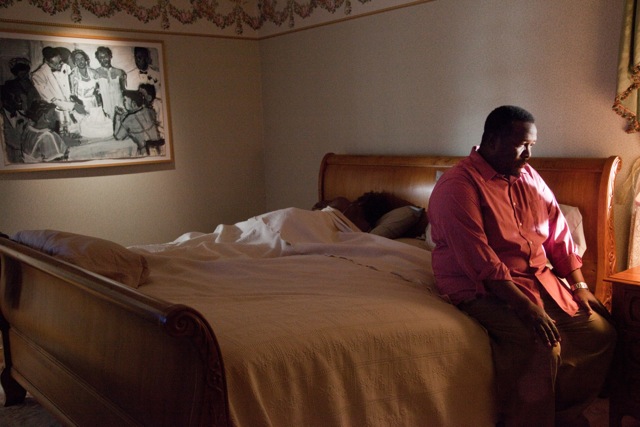By Beanie Barnes
 As tough as failure may be, something good can come of it – an opportunity for improvement. There is a stigma and shame that tends to come with failure, so much so that people rarely accept “failure” as an actual reason for failure. We often bury failure and, along with it, any opportunity to learn and grow from examining it.
As tough as failure may be, something good can come of it – an opportunity for improvement. There is a stigma and shame that tends to come with failure, so much so that people rarely accept “failure” as an actual reason for failure. We often bury failure and, along with it, any opportunity to learn and grow from examining it.
Failure is cumulative. Just as success can breed more success, failure can breed more failure. Which is why it is so important to learn from it. That’s why, as noted in my previous article, I’m providing details about my failed effort as a first time distributor, working on the film, FOUR.
I realized my experience with failure was just one of thousands that happen every year. And rather than sweep it under the rug, I recognized the value of it. Because while filmmakers are so diverse, failure is something we likely all have in common, which presents many valuable opportunities for us to learn from each other. So, I’m taking a chance by sharing some lessons of my own.
FOUR was produced in 2011. The SAG Ultra Low Budget film was one of the first 125 films to successfully raise money on Kickstarter. It went on to screen at, and even win, a few notable festivals in 2012 (e.g. LA Film Festival, Urbanworld). It obtained VOD/DVD distribution in February of last year, but the filmmakers held on to the theatrical rights with the hope of having a nice theatrical release.
I got involved having had relationships with the filmmakers for several years who were open to my background in production, strategy and consulting. We negotiated a service deal of sorts. I took a minor fee to modestly pay my team, and balanced it against a small percentage of the film’s revenue. So, basically, if the film didn’t do well, neither would I. Given this would be my first time distributing, wantedso theye the film’s performance
In FOUR, I saw an opportunity to try some new things given the industry battle cry that “distribution is broken.” And my small team (two fulltime, including myself, and four short-term part-time) was able to accomplish a lot with a total P&A budget of $48k. We cut a trailer and character teasers in-house, built great web and mobile sites, designed magazine-style Press Kits, established interesting Wikipedia pages for the film and the actors, and designed Key Art to appeal to two different audiences. I even retroactively obtained Title and Clearances Reports…securing E&O insurance for just over $2,000.
We secured 10 screens with AMC Theatres and Laemmle. I set promotional screenings at two prominent annual conferences – one for LGBT journalists and another for blacks techies. Our trailer was running on nearly 20 sites (including iTunes) and ran theatrically before films like Blue Jasmine, The Best Man Holiday, The Spectacular Now and Fruitvale Station. I sent out two targeted national press releases along with direct mailers of mini-posters, postcards and personalized letters to 200 black and LGBT businesses. We even organized an effort to net over 100 volunteers in exchange for free tickets to opening weekend.
We had a notable actor in the film, for whom I managed to land a big national interview. We had source material from a Pulitzer finalist playwright, supported by great reviews of past Off-Broadway runs. We had a respected and well-known playwright/filmmaker as an executive producer. We had a strong review in the New York Times and several features of the director in LGBT publications. We got an “R” rating from the MPAA on our initial submission (amazing given an interracial gay sex scene between a middle-aged man and a teenager). We even arranged a simultaneous release campaign on Tugg, reaching out to about 200 organizations, incentivizing non-profits with a $2,500 prize if a certain amount of screenings were met.

Our social media efforts were backed by AMC and we organized three sweepstakes with prizes ranging from and a night on the town with friends to a trip to NYC. Not only did we secure an actual “premiere” at the Brooklyn Academy of Music (BAM), with a Q&A moderated by Matt Taibbi (of then, Rolling Stone), but I also set up a promotional tour with the actors and director, across all ten cities – very rare for a SAG Ultra Low Budget film. I even had different Q&A moderators for nearly each city, like Michael Eric Dyson in Baltimore.
Ultimately, none of this worked. And, it was a very tough pill to swallow.
Here are 15 things I learned from this experience:
1. Never Lose Focus of Not Losing Money
When I began, my focus was not on making money, but on not losing it. Then, I got caught up in the positive momentum and the hope of being successful. Keep in mind that the success rate for indies that a) get distribution AND b) make money is about 1%. So, focusing on not losing money allows you to count every dollar saved as a dollar earned and prevents you from making reactive/irrational decisions based on emotion…which is very easy to do when things are seemingly going well.
2. Information is Your Friend
I’ve never understood, in an industry where so many people lose money, why getting budget/revenue information is like breaking into a temple guarded by ninjas. When you’re making/distributing a film, you should be an information whore – getting it from wherever you can – because information just might save you from falling into a ditch somebody else already fell into. Remember, learning from your own mistakes makes you smart, but learning from other people’s mistakes makes you wise.
3. Pick Your Target Audience
There is only one. Don’t try to squeeze two pegs into a hole that only fits one peg. This does not mean that other audiences [outside of the target audience] won’t see your film, but that you have to prioritize to maximize. Ultimately, a film’s audience may not end up being the audience initially intended…and that’s okay. But you’ll never find, connect with, or maximize that audience so long as you’re trying to serve two masters.
4. Revise, Revise, Revise
You will be hit with new information at some point. Always assess all angles of that information and be willing to change your strategy accordingly. For example, initially I thought we’d be lucky to secure two screens. So, getting 10 screens across the country required a substantial shift my initial strategy, which I could have adjusted sooner and better. For a small film, any new information can make a big impact on your bottom line and, if you don’t make timely, thoughtful adjustments, you’re likely decreasing your film’s probability of success.
5. “No” Can Be a Good Thing
When I first started reaching out to indie theatres, many either declined the film or ignored me. Yet, one major indie exhibitor dealt me a “no” that stung more than any other. Instead of looking at that “no” from the perspective of not losing money, I viewed it as a personal challenge, which anchored my thinking. “No” is not always an obstacle or an assault on your ability…sometimes it’s just a practical response worthy of real evaluation. I forced FOUR into the marketplace by sheer will, but at what cost? “No” is always an opportunity to re-assess, and that re-assessment might just be what saves you in the end.
6. Overconfidence Can Undercut You
Overestimating what can go right means you’re underestimating what can go wrong. For example, I was thrilled when I landed a national interview for one of our actors — a show with a weekly audience of nearly 10 million. The show was prepped, in detail, weeks in advance about the film’s meaning. Yet, when the interview happened…the interview did not go as planned. I realized I had tripped over that fine line between confidence and overconfidence. Confidence is believing you can secure a national interview, then going out and getting it. Overconfidence is believing that the interview will go smoothly, and not having a plan in place in the event that the interview goes to shit.
7. Volunteers Don’t “Volunteer”
Volunteers are advocates, evangelists and representatives for your film. So, don’t bribe them…inspire them. And free tickets to see a film may not cut it…not on a small film with little buzz behind it. People want to feel like they’re a part of something bigger than promoting someone else’s personal dream. Try other things (and try them early) and don’t hold on to ideas for too long when you realize they’re not working.
8. The Trouble with Premieres
The last thing you want to be doing with your time is fending emails from managers and assistants asking if they can have more tickets to the premiere. And, on a film with very little resources, is a premiere really worth it? Though we had a great premiere, it really cut into our time/focus on the overall theatrical release, and we ended up getting very little out of it. So, if you’re thinking of doing a premiere…take out the vanity of “having a premiere.” If what’s left, including the cost, is still worth it to you, then go for it.
9. Distributors ARE Storytellers
Many filmmakers dismiss the release process as being orchestrated by a bunch of non-creative “suits.” But bringing an audience to a film is creative and worthy of respect. Thoughtful strategists and distributors can give a film a better probability of success. As the brilliant Sheri Candler tweeted several weeks back, “it is very immature to believe creators just create, others figure out what to do with the creation.”
10. Start Early
You will never have enough time. And something is very likely to fall through the cracks when there are a ton of moving parts. So, if you are able, try to start at least six months out. More time (or a more effective use of it) means that you have cushion to make adjustments to your release, more time to connect with your audience, and that you’re less likely to come down with a case of Twitter Bullhorn Syndrome (aka “Twitter B.S.”…see #12).
11. Sometimes Less is More
While you may have big ideas to try to connect with an audience, whether or not those ideas are warranted is a whole different thing. Each film is unique…and a quiet film may require a quiet release. Unfortunately, that is not always obvious, so listen to the film…it will let you know how “loud” to speak on its behalf.
12. Be Personal
 If you’re “selling” the film, you’re missing the point…and you’re missing your audience. Distributors aren’t car salesmen. And if your distributor is coming off like one (i.e. using Twitter as a bullhorn), then you’ve likely already lost your paddle somewhere up shit creek. When you lose your personal touch, or your ability to personally reach people (as Charles Judson details), you will reek of desperation. And desperation is not promotion. It’s just annoying.
If you’re “selling” the film, you’re missing the point…and you’re missing your audience. Distributors aren’t car salesmen. And if your distributor is coming off like one (i.e. using Twitter as a bullhorn), then you’ve likely already lost your paddle somewhere up shit creek. When you lose your personal touch, or your ability to personally reach people (as Charles Judson details), you will reek of desperation. And desperation is not promotion. It’s just annoying.
13. Don’t Take it Personal
You have to put in the work and try your best….which may still not be enough. Again, indie films have about a 1% chance of market success. So, you can’t take a 99% chance of market failure personally — especially if you were passionate and you busted your ass.
14. The “Serenity Prayer” is Real
You have to accept the things you cannot change, the courage to change the things you can, and the wisdom to know the difference.
15. Resources and Prayers Go Hand-in-Hand
You have to spend money to make money. To even have a shot at market success, not only do you need money, but you also need momentum. Money often feeds momentum and momentum often feeds money. Labs, grants, awards at reputable festivals/competitions…few films go anywhere without industry support and community. If you’re struggling with money and momentum, refer to #1 when deciding how best to proceed.
FOUR was a beautiful film, by a talented director. Yet, few people saw it. I used to second-guess myself a lot…should I have done anything differently? Perhaps. But, even if I did…in a crowded marketplace in which I had few resources, would it have made any sizeable difference?
Unfortunately, I can point to so many filmmakers that have had a similar experience. And, while our efforts may have failed, none of us are failures. Those who fail are often courageous, creative, talented, hard-working and visionary…just like those who are successful. Which makes the randomness of success in film all the more brutal…and at the same time, all the more sweet.
 Beanie Barnes is a strategist and film industry professional. A Project: Involve fellow with Film Independent, a two-time semi-finalist for the Nicholl Fellowship and an annual lecturer at the Ghetto Film School, Beanie distributed her first film, FOUR, in 2013. She holds a B.A. from the University of Nebraska and an M.B.A. from Yale University.
Beanie Barnes is a strategist and film industry professional. A Project: Involve fellow with Film Independent, a two-time semi-finalist for the Nicholl Fellowship and an annual lecturer at the Ghetto Film School, Beanie distributed her first film, FOUR, in 2013. She holds a B.A. from the University of Nebraska and an M.B.A. from Yale University.
© 2014





